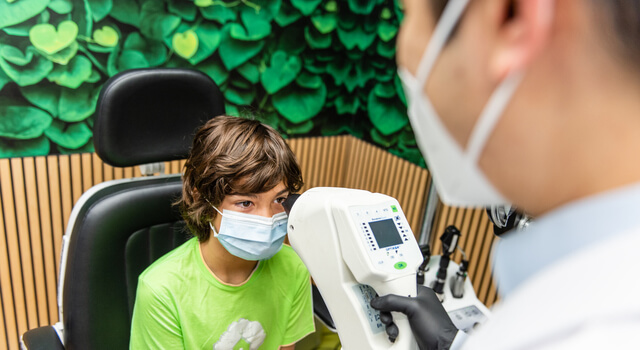
Is your child squinting more than usual? Is she or he having difficulty reading or seeing distant objects, even if they already wear glasses or have recently had an eye exam?
Optometrists throughout the country are seeing more cases of myopia than ever before due to the effects of the COVID-19 pandemic. The drastic increase in indoor and screen time associated with virtual classrooms is taking a toll on children’s eyes, resulting in what optometrists are calling "quarantine myopia".
How Has the COVID-19 Lockdown Contributed To Myopia?
COVID-19 has impacted the lives of many, whether through infection or as a result of the ripple effect of this pandemic, such as lockdowns. The periodic school shutdowns are causing children to spend significantly more hours a day inside and in front of their screens. It is, therefore, no coincidence that eye doctors have been detecting a steep rise in myopia cases during this period.
But First, What Is Myopia?
Myopia is a disease where the eye grows too long, causing light to be focused at the front of the retina instead of directly on it. This results in blurred vision when looking at a distant object. Myopia typically starts in childhood and progresses throughout school-age years, meaning a child’s vision continues to deteriorate as their eye grows too long.
While the causes of myopia are not yet fully understood, we now know that genetics and certain environmental factors play a significant role in its development. Doing excessive near work activities, like spending hours on a computer or other digital device, and staying indoors has been linked to the development or progression of myopia in children.
A recent study observed the effects of the COVID-19 lockdown on over 120,000 Chinese children and found that home confinement had considerably increased myopia levels in those aged 6-8. These children had a diopter change of 0.3 during the lockdown. In other words, their vision significantly deteriorated during the lockdown.
When children have myopia, it's not just an inconvenience. It can also put them at risk of developing serious, sight-threatening eye diseases such as cataracts, macular degeneration, glaucoma, and retinal detachment later in life. That’s why so many parents choose myopia management to protect their children’s long-term vision and eye health.
Can Myopia Be Treated?
Yes, it most definitely can! At Hartsdale Family Eyecare, we're committed to ensuring the best possible outcome for your child’s visual and ocular health. That means using the best, most effective treatments to slow or even halt your child’s myopia progression.
We work with you and your child to find the most suitable, convenient, and comfortable myopia treatment based on your child’s needs and lifestyle.
It’s never too early to start treating your child’s myopia. Offer your child the gift of sight for the long term by finding the nearest provider to you:
Q: Can you request lenses made from glass? Is glass still used for lenses?
- A: Yes. Opticians still sometimes use glass for lenses. However, glass is not used very often because they aren’t as safe. If these glass lenses breaks, they can shatters into many pieces and can injure the eye. Glass lenses are much heavier than plastic lenses, so they can make your eyeglasses less comfortable to wear.
Q: Can a coating be added to eyeglasses to protect them from further scratches?
- A: A protective coating can’t be added to a lens after it’s scratched. The coating is applied when the lens is manufactured and can’t be put on later.
Quality Frames For Prescription Eyeglasses & Computer Glasses In Hartsdale, New York. Visit Hartsdale Family Eyecare for an eye exam and eyeglasses that match your style.
